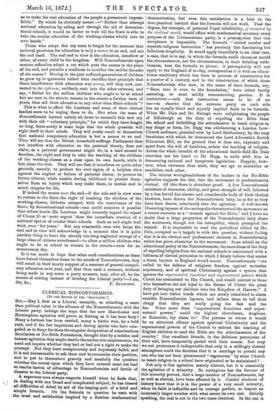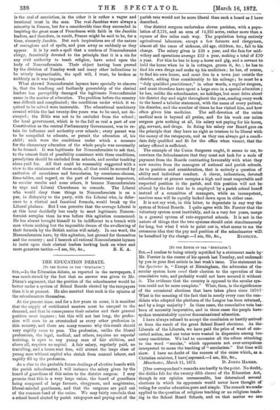CLERICAL NONCONFORMISTS.
ITO THE EDITOR OF THE SPECTATOR:]
Sm,—May I, first as a Liberal, secondly, as attaching a more than political value to the alliance of the Nonconformists with the Liberal party, indulge the hope that the new Manchester and Birmingham agitation will prove as fleeting as it has been fiery? 1lEany a fortress has been carried, many a battle won, by a bold rush, and if the few impetuous and daring spirits who have com- pelled us to forge for them the singular designation of conscientious Secularists or No-Bible Protestants, thought that by a sudden and intense agitation they might startle the nation into acquiescence, we need not inquire whether they had or had not a right to make the attempt. But they have conspicuously and hopelessly failed, and it is not unreasonable to ask them now to reconsider their position, and to put to themselves gravely and manfully the question whether the course upon which they have entered must not lead to results barren of advantage to Nonconformists and fertile of disaster to the Liberal party.
A sagacious man always suspects himself when he finds that, is dealing with any broad and complicated subject, he has cleared all difficulties of detail by aid of the leaping-pole of a brief and simple formula. On the formula in question he rests with the trust and satisfaction inspired by a flawless mathematical demonstration, but even this satisfaction is a hint to the true practical instinct that the formula will not work. That the
dogma, for example, of personal Papal infallibility, if accepted by the civilized world, would effect with mathematical accuracy every purpose of the Ultramontane party, is a presumption that this acceptance is impossible. The formula " united secular and separate religious instruction " has precisely this fascinating but fallacious simplicity. It would apply beautifully to an ideal case, a case, that is to say, in which the formula could choose or mould the circumstances, not the circumstances, in their bristling ruth- lessness, tear the formula to pieces ; it peremptorily will not apply to the England of to-day, overspread as it is with an educa- tional machinery which has been in process of construction for a quarter of a century, and to the construction of which those Nonconformists who now, in the name of their formula, cry, " Raze, raze it even to the foundation," were either tacitly assenting, or most mildly remonstrating parties. It is instructive—only that instruction seems to be of no use—to observe that the extreme party on each side has an equally blind and equally implicit faith in its formula. When Mr. Dale and Dr. Raleigh were enlightening the people of Edinburgh on the duty of expelling the Bible from the school and forbidding the schoolmaster to teach religion in any shape or form, Dr. Begg was exhilarating a London Low- Church audience, presided over by Lord Shaftesbury, by the racy fanaticism with which he denounced the Lord Advocate's Scotch Education Bill, on the ground that it does not, expressly and apart from the will of localities, ordain the teaching of religion. Across the whole breadth of the educational battle-field Mr. Dale stretches out his hand to Dr. Begg, to unite with him in denouncing rational and temperate legislation. Happily, how- ever, when extremes thus meet, they are apt to neutralize or annihilate each other.
The intense wrongheadedness of the leaders in the No-Bible agitation suggests the idea that the movement is predominantly clerical. Of this there is abundant proof. A few Nonconformist ministers of character, ability, and great strength of will, followed by a less fervid but sincere and considerable body of their clerical brethren, have drawn the Nonconformist laity, in so far as they have been drawn, reluctantly into the agitation. A well-known Dissenting layman of the metropolis characterized the movement on a recent occasion as a "crusade against the Bible," and I have no doubt that a large proportion of the Nonconformist laity share the sentiment, though not the intrepidity, which prompted the remark. It is impossible to read the periodical edited by Mr. Dale, occupied as it largely is with this question, without feeling that it is the clerical and professional element in Nonconformity which has given character to the movement. In an article on the educational policy of the Nonconformists, the sacredness of the duty of expelling religion from the national schools is maintained with a loftiness of clerical pretension to which I firmly believe that scarce a dozen laymen in England would assent. Nonconformists " are called to the defence of religious freedom against sectarian supremacy, and of spiritual Christianity against a system that ignores the supernatural functions and supernatural powers which Christ has committed to His Church, and would entrust to those who themselves are not loyal to the throne of Christ the great duty of bringing our children into the Kingdom of Heaven." I have put into italics words which are surely calculated to alarm sensible Nonconformist laymen, and induce them to tell their clergy that they are really going too fast and too far. What more than "supernatural functions and super- natural powers" could the highest churchman, Anglican or Romanist, lay claim to? The persona to whom it would be an atrocious offence against spiritual Christianity and the supernatural powers of the Church to entrust the teaching of English children to read the Bible are the schoolmasters of the country! Our excellent friends, in the delirious paroxysms of
their zeal, have temporarily parted with their senses. But may we not pronounce it indisputable that only in a stiflingly clerical atmosphere could the doctrine that it is sacrilege to permit any one who has not been pronounced "regenerate" by some Church to teach religion in a school have originated or be maintained ?
Not only is this agitation mainly clerical, but it is essentially the agitation of a minority. So contagious has the fervour of this minority proved, that a large number of Nonconformists, lay as well as clerical, have been affected by it. Careful students of history know that it is in the power of a very small minority, when its faith is inflexible and its courage perfect, to inspire an immensely larger number with what seems its own zeal. Strictly speaking, the zeal is not in the two cases identical. In the one it is the zeal of conviction, in the other it is rather a vague and irrational trust in the men. The real Jacobins were always a minority in France, but for a considerable time they succeeded in inspiring the great mass of Frenchmen with faith in the Jacobin leaders, and therefore, in result, France might be said to be, for a time, sincerely Jacobin. But such inspirations are of the nature of contagions and of spells, and pass away as suddenly as they appear. It is by such a spell that a nucleus of Nonconformist clergy, fanatically devoted to the principle that it is a sin for any civil authority to teach religion, have acted upon the body of Nonconformists. Their object having been proved by the division of Tuesday week and many other indications to be utterly impracticable, the spell will, I trust, be broken as suddenly as it was imposed.
What shrewd Nonconformist laymen have specially to observe is, that the headlong and foolhardy generalship of the clerical leaders has perceptibly damaged the legitimate Nonconformist cause in the matter of education. The problem before the country was difficult and complicated ; the conditions under which it re- quired to be solved were inexorable. The educational machinery created within the last twenty-five years was to be used, not de- stroyed ; the Bible was not to be excluded from the school ; the local government, which is to the full as real a part of our Constitution as the central Parliamentry Government, was to re- tain its influence and authority over schools ; every parent was to be compelled to educate, or permit the education of, his child ; such were the conditions under which a measure for the elementary education of the whole people was necessarily to be framed. It was legitimate for Nonconformists to ask that, to the utmost limit of possibility consistent with these conditions, proselytism should be excluded from schools, and secular teaching alone paid for. All that could be reasonably suggested with a view to the attainment of those ends, all that could be secured by exclusion of catechisms and formularies, by conscience-clauses, time-tables, and regard, on the part of Government inspectors, to secular results and none others, it became Nonconformists to urge and Liberal Churchmen to concede. The Liberal who would deny these things to Nonconformists is on a par, in disloyalty to the party, with the Liberal who, in defer- ence to a clerical and fanatical formula, would break up the Liberal phalanx. But I can perceive that the average Liberal is at this hour decidedly less ready to meet legitimate Noncon- formist scruples than he was before this agitation commenced. He has almost brought himself to be indifferent to a breach with men whom nothing but the impossible dream of the swallowing of their formula by the British nation will satisfy. In one word, the Nonconformists have, by this agitation, lost ground for themselves and the country ; and I beseech all rational Nonconformist laymen to insist upon their clerical leaders harking back on wiser and more generous tactics.—I am, Sir, &c., B. K. A.



































 Previous page
Previous page